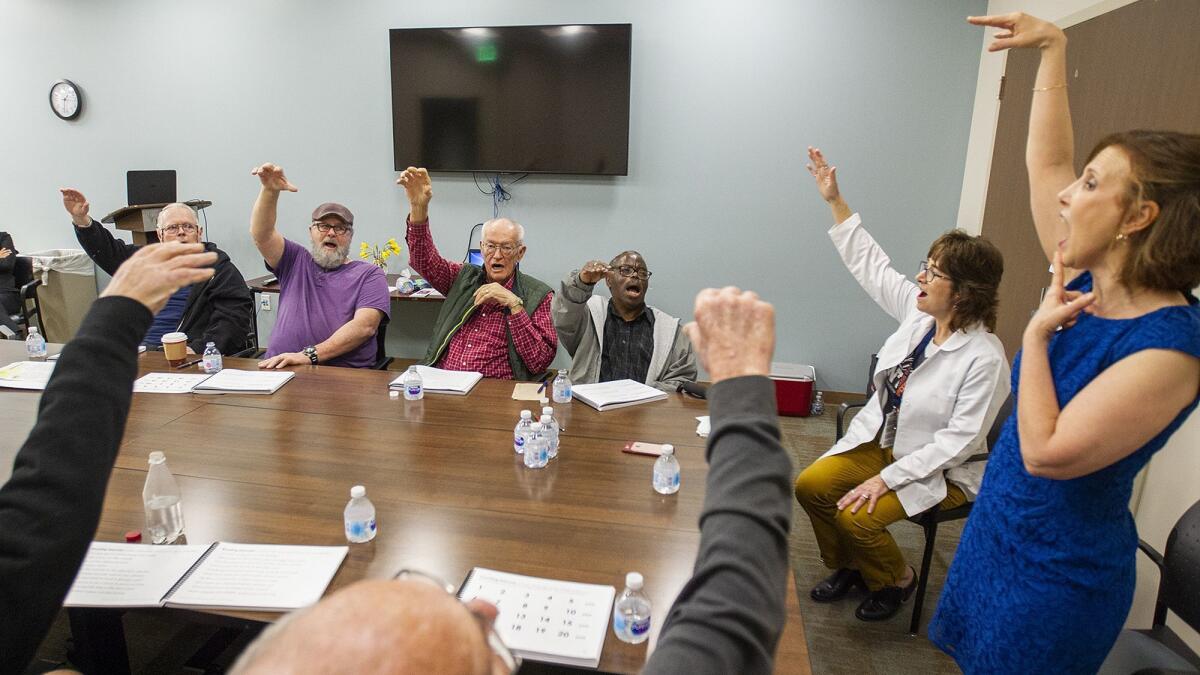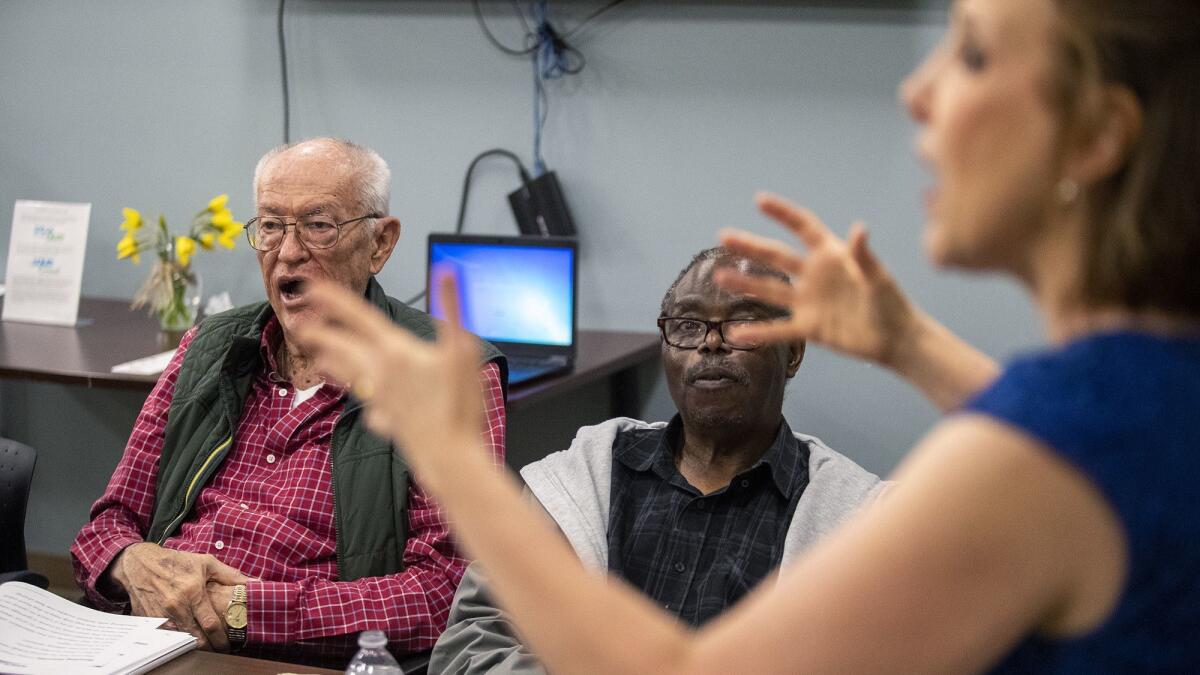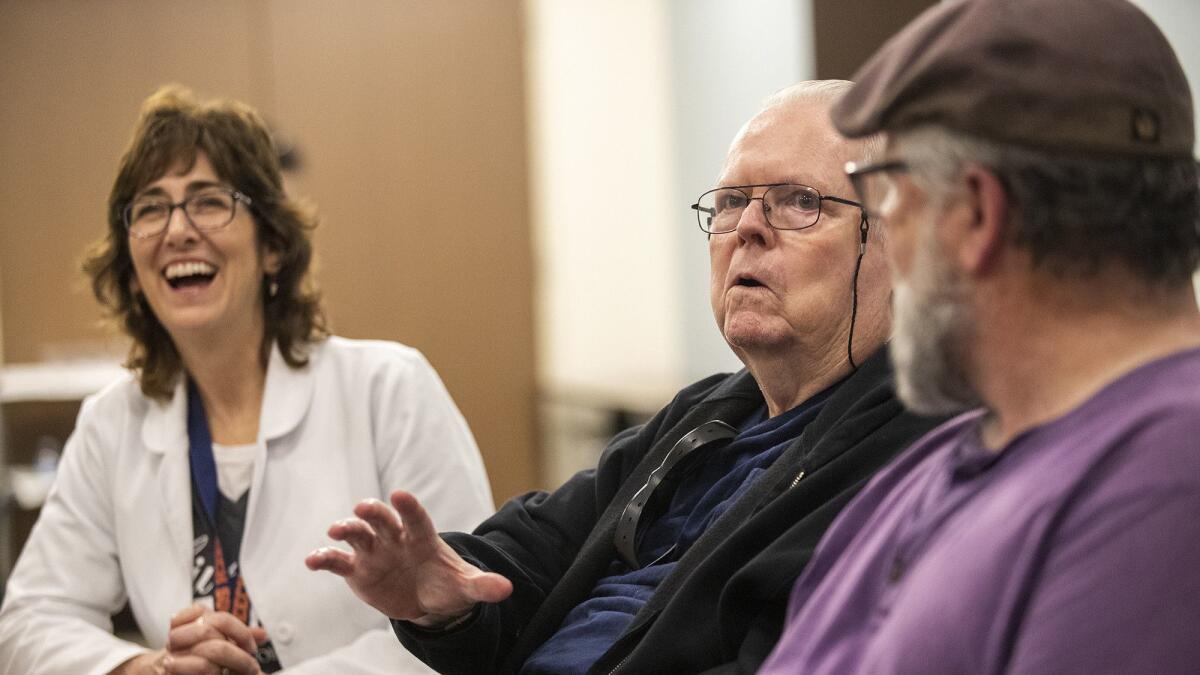Parkinson’s disease patients find their voices again with help from speech therapists in Los Alamitos

The patients gathered around tables at Los Alamitos Medical Center speak clearly and strongly. It’s no coincidence. The power of their individual voices is threatened by their shared diagnoses.
They are living with Parkinson’s disease, a progressive, degenerative neurological condition that affects movement — not just obvious motor skills but the abilities to speak and to swallow. To keep and improve their voices — and by extension, their agency and identity — they participate in specialized speech therapy called Loud Crowd.
“May, me, my,” they chant in unison as a warm-up, the M sounds buzzing. “Moe, moo.”
“I like that voice,” speech-language pathologist and Loud Crowd creator Samantha Elandary tells one of the men. “It sounds good.”
With her trained ear, Elandary can hear the tell-tale softening and slowing caused when neurons die and stop producing the neurotransmitter dopamine, which sends messages to throat muscles that direct their normal function.
She has patients put effort into their words without shouting. This is what she calls speaking with intent, using pathways in the brain that are less reliant on dopamine.
“We need to be in control of our voices,” she encourages the bunch.
They hold a monotone “ahh” for about five seconds, gliding their voices to higher and lower registers to drill the use of inflection. They count and read aloud, connecting words and sounds the way they might stitch together if written in cursive.
Los Alamitos Medical Center was one of 92 clinics and hospitals nationwide to win grants last year in order to offer Loud Crowd and its sister program, Speak Out, to patients like Sam Sebabi.
Like the others in the therapy group, Sebabi, 71, is older and accomplished. He speaks with the lilt of his native Uganda.
He was diagnosed with Parkinson’s nine years ago, and though his doctors tell him he has a slow-progressing form, his voice began to falter. He described his speech as “babbling.”
“By nature I have a loud voice, and when I stammer, people have a hard time understanding me,” he says.
He fancies himself funny and competitive. With the Loud Crowd therapy, Sebabi, who now lives in Signal Hill, regained his confidence.
“Before, I was avoiding people,” he said.

Los Alamitos neurologist George Wang explains that as neurons, or nerve cells in the brain, die off, patients lose coordination. This can lead to tremors, shuffled gait and slurred, stuttering or whispery speech. Wang says directed speech therapy maximizes the remaining potential ability, but cannot reverse degeneration.
The conscious effort Elandary stresses as a foundation of speech maintenance can also save lives. Speech, eating and breathing rely on the same muscles, all of which are impacted by Parkinson’s. She says the majority of deaths in Parkinson’s patients are caused by aspiration pneumonia, a lung infection that develops after breathing in food, saliva or stomach acid instead of swallowing.
Speech therapist Lynn Gallandt, who works at the medical center, says the mechanics of speech are automatic in healthy people.
“We don’t have to think about our breathing, where our tongue is,” she says.
As Parkinson’s forces movements to get smaller, speech patterns change. Though the disease is progressive and has no cure, patients can gain back some control through their vocal exercises.
“I see hope,” Gallandt says. “I see them starting to realize, ‘I have a voice again.’”

Elandary started Loud Crowd 20 years ago in her Texas living room as a monthly speech and social group that follows the foundational program started by Speak Out.
The programs have been replicated worldwide and providers are available in Orange County hospitals, including Hoag in Newport Beach and Orange Coast Memorial Medical Center in Fountain Valley.
To learn more, visit parkinsonvoiceproject.org.
More to Read
Get the Latinx Files newsletter
Stories that capture the multitudes within the American Latinx community.
You may occasionally receive promotional content from the Los Angeles Times.







